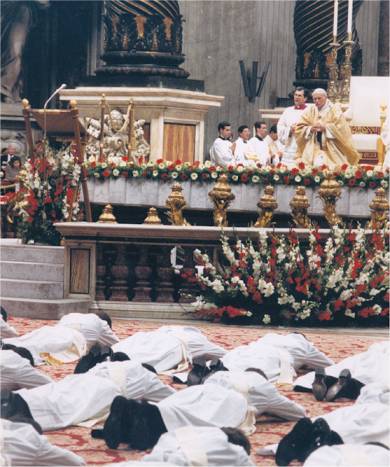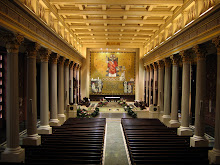The first reading that we have today is one of those almost garish readings from the Old Testament. To our modern ears, it is incredible that God would ask for a human sacrifice, that God would seemingly demand that Abraham, after a long journey of faith, would now have to kill the one gift that he has been waiting and waiting for: the gift of his son.
Plus, today the Church comes out so vociferously on the side of life, which this seems to be a senseless act. How is it that a Church that is so pro-life could hold up the example found in this Scripture passage?
Well, as we look at this passage, I think what has to be kept in mind is that this is a passage about Abraham, not Isaac, his story will be told later. In our typical modern mindset, it is easy to lose track of the scope and depth of the story of Abraham, how he became our Father in Faith, that this story jumps off the page at us. So, let us turn back and look at his example, so that we may learn from his faith.
In the early part of his life, even after he was given the great promise from God that ‘he would become the father of many nations,’ Abraham always traveled with a security blanket, so to speak. When he was called to leave his homeland, he took his nephew Lot with him. When he visited Egypt, he sold his wife out to the pharaoh, so that he would not become jealous of Abraham. He protects his son Ishmael (through the harlot Hagar) when his wife Sarah tries to send him away, because she knew that as long as Ishmael was with Abraham, Abraham would not fully trust.
All through this process, God is working on Abraham, trying to increase his faith, so that finally God is able to grant that deep desire of Abraham’s heart: once that heart is fully purified, God grants that Isaac may be born. The promise made many, many years ago is finally starting to be fulfilled. Abraham’s faith is now true, and centered on nothing else. What becomes remarkable at this stage is that he is no longer holding on to some type of security blanket, but is ready and willing to give back to God the great gift that God has given to him in his son. What a beautiful testimony!
But there is an even deeper level than this. Whenever we read the Old Testament as Catholics, we always read it through the lens of Christ, typology is inescapable.
Here, in the passage that was trimmed from the pericope that we have heard is how Isaac carried the wood of his own impending sacrifice up the hill to the place of Sacrifice. This immediately brings to mind Jesus carrying his cross up the Hill of Calvary. The Church Fathers richly developed this theme and expounded upon it in the years after Jesus life, death and resurrection.
But there is even something more that is here in this passage that has another impact for the Christian believer. Ancient Jews, even up to the very day of Christ were very aware of where Mt. Moriah was. They knew what happened on that mountain, for it was known in their day as Temple Mount. This is the last part of the Holy Land that was conquered by the people, this was the mountain that as David brought up the Ark of the Covenant, he danced before it naked in jubilation. Finally, this holy site from the deep recesses of the past was part of the patrimony of the Jews. It was on this mountain that Solomon built the first Temple, the Western Wall still stands today (of the later Temple.)
Jewish Christians at the time of Jesus and the Apostles would have been very aware of these connections, and it would have confirmed the truth of who and what Jesus truly was.
But there is even more! In the comparison between the Sacrifice of Isaac and the future Sacrifice of Christ, we see how the New Covenant completed and replaced the Old Covenant, for the New took it to a deeper degree.
The Sacrifice of Isaac is not only a foreshadow of Christ’s Sacrifice, but it is also a foreshadow of the Old Covenant Sacrifice, which was imperfect. Abraham wanted to give the greatest gift he had been given (Isaac) by God back to God, but was prevented by God’s own hand. Instead, Abraham offers a propitiatory sacrifice, a sacrifice of the ram caught in the thicket as a replacement for his very own son. In the Old Covenant begun under Aaron and Moses, the priest had to do the same thing. He had to first offer, on the Day of Atonement, a propitiatory sacrifice of a bull, in place of himself, because he could not offer himself.
In the New Covenant, the Sacrifice is no longer of one offering another, it is now Christ offering Himself. This makes all of the difference! By giving Himself, He is able to overcome the weaknesses of the Old Covenant and establish an unbreakable bond between the human race and God. All things become new in Christ! The limitations and weaknesses of the old are completed and renewed in Christ. This is what we are preparing to enter anew at Easter.
Therefore, as we continue our journey through Lent, what we see in the example of Abraham and of Christ is that it is not enough to offer God just the leftovers, what remains after we have taken care of ourselves. Rather, let us throw off the security blankets that we have accumulated around us and offer back to God the most precious gift that He has bestowed upon us: our very gift of self as an offering back to God, in the model and mode of Christ, that He may do as He wishes with our lives and build and establish His Kingdom through us.










2 comments:
very nice homily, father.. however, I have a question.
It reminded me of recent play about Jozue @ Jericho, because I think my understanding of it is very little. All concept of Jewish nation and Promised Land. If some nation nowadays went somewhere because God told them that it is their promised land, and killed everyone who was in the city except a family of the woman who gave the entrance to the city to them... I hope you get my point.
Could someone explain this to me? I am a catholic girl, I'm not sure if I'm off-topic here, but I'd like to understand this part of Bible a bit better.
A description that our Scripture prof in seminary used for 'putting things under the ban' so that everything was killed before Israel took possession of an area was so that the false gods and practices of these areas would not be incorporated into Jewish ritual and practice. They hadn't done so well in Egypt, and God knew that their faith wasn't yet strong enough to be able to distinguish between what was good in society and what was evil. (Of the things left, they often took the evil!)
Post a Comment